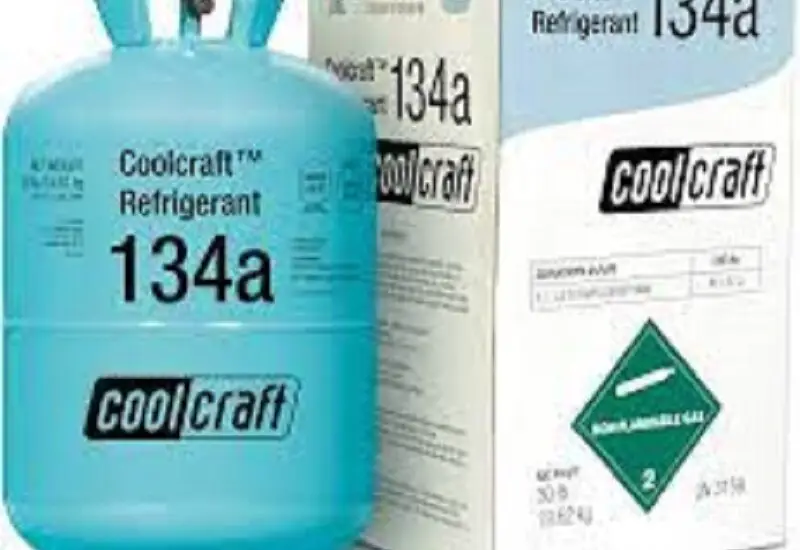Refrigerant for refrigerator – a cool, critical component of the fridge’s operations. It’s the secret sauce, the magic elixir that helps your refrigerator stay, well, refrigerated. But what is it exactly? What role does it play? And what types are there? This article aims to answer all these questions and more!

Table of Contents
Understanding Refrigerants
Let’s not keep you in suspense any longer. Here’s a quick, need-to-know guide about refrigerants.
What is a Refrigerant?
Think of a refrigerant as the lifeblood of your refrigerator. Just like your blood circulates through your body, a refrigerant circulates through the refrigerator, absorbing heat from the inside and releasing it outside.
The Role of Refrigerants in Refrigeration
A refrigerant, in essence, is what keeps your food cold and safe. It absorbs heat from inside the refrigerator and releases it outside, ensuring your veggies stay crisp and your ice cream stays frosty.
The Basic Properties of Refrigerants
Refrigerants need to have certain properties to work effectively. They should have a low boiling point, low toxicity, and they should be non-flammable. Did you know these little things were so interesting?
Types of Refrigerants
Let’s talk about the different types of refrigerants. It’s a bit like a boy band – each one has its own qualities and quirks.
Chlorofluorocarbons (CFCs)
Remember the 80s? Big hair, neon colors, and CFCs. These refrigerants were popular back in the day, but they’ve fallen out of favor due to their high ozone depletion potential. Not cool, right?
Hydrochlorofluorocarbons (HCFCs)
Meet the middle child, HCFCs. They were used as a replacement for CFCs. While they’re less damaging to the ozone layer, they’re still not perfect. Progress, but we can do better.
Hydrofluorocarbons (HFCs)
Next up, we have HFCs. They don’t harm the ozone layer, but they have a high global warming potential. It’s a bit like swapping one problem for another.
Natural Refrigerants
Last but certainly not least, we have natural refrigerants. They’re eco-friendly and efficient – like the dream team of refrigerants. But they have their challenges too.
Key Factors in Choosing a Refrigerant for Refrigerators
Choosing a refrigerant isn’t just a case of picking the prettiest one. There are a few key factors to consider.
Energy Efficiency
When it comes to choosing a refrigerant, you want one that won’t run up your energy bill.
The Relationship Between Refrigerants and Energy Efficiency
The type of refrigerant used can affect your refrigerator’s energy efficiency. It’s all about how much heat they can absorb and how quickly they can release it.
Most Energy Efficient Refrigerants
So which refrigerants are the most energy-efficient? Natural refrigerants, like hydrocarbons, tend to be more energy-efficient than their synthetic counterparts.
Environmental Impact
Another important factor is the environmental impact of the refrigerant. No one wants their cold drinks to contribute to global warming, right?
Global Warming Potential of Refrigerants
Some refrigerants, like HFCs, have a high global warming potential. This means they can trap heat in the atmosphere, contributing to global warming.
Ozone Depletion Potential of Refrigerants
CFCs and HCFCs have a high ozone depletion potential, meaning they can damage the ozone layer when released into the atmosphere.
Click here for more articles similar to this one – – Articles on Refrigerants: The Ultimate Guide to Understanding Them
Safety Considerations
Safety first! Some refrigerants can be toxic or flammable, so it’s crucial to choose wisely.
Toxicity Levels of Refrigerants
Most refrigerants are relatively safe, but some, like ammonia, can be toxic if leaked in large amounts. Always something to keep in mind.
Flammability of Refrigerants
Some refrigerants, particularly some natural ones, can be flammable. But don’t worry – manufacturers take this into account when designing refrigerators.
The Shift Towards Eco-Friendly Refrigerants
With the climate crisis on everyone’s minds, there’s been a big shift towards eco-friendly refrigerants. Let’s explore this more.
The Environmental Impact of Traditional Refrigerants
Traditional refrigerants, like CFCs and HCFCs, have been linked to ozone depletion and global warming. But change is afoot.
The Role of Refrigerants in Climate Change
Some refrigerants have a high global warming potential. This means they can trap heat in the atmosphere, contributing to climate change.
Regulation and Policy Impacting Refrigerant Use
In response to these environmental concerns, there have been changes in regulation and policy. Countries around the world are phasing out harmful refrigerants in favor of more eco-friendly options.
Advancements in Eco-Friendly Refrigerants
It’s not all doom and gloom. There are exciting advancements in eco-friendly refrigerants. Science to the rescue!
The Rise of Hydrofluoroolefins (HFOs)
Meet HFOs – the new kids on the block. They’re similar to HFCs but have a much lower global warming potential.
Natural Refrigerants: Hydrocarbons, Ammonia, and Carbon Dioxide
Then there’s the natural refrigerants. Hydrocarbons, ammonia, and carbon dioxide are all viable options that are kinder to the environment.
Challenges and Prospects of Implementing Eco-Friendly Refrigerants
While eco-friendly refrigerants are the future, there are still challenges to overcome.
Technological Challenges
One of the challenges is technology. For example, using natural refrigerants often requires a complete redesign of the refrigeration system.
Market Trends and Future Prospects
Despite these challenges, the future looks bright. The market is trending towards eco-friendly refrigerants, and with continued research and innovation, we can expect even more exciting developments.
Conclusion
So there you have it – a whistle-stop tour of the world of refrigerants.
Key Takeaways
The type of refrigerant used in your refrigerator matters. It can impact energy efficiency, the environment, and safety. And with the shift towards eco-friendly refrigerants, there’s never been a more exciting time to be a fridge… or a refrigerant enthusiast!
Looking Forward
Looking forward, the refrigerant landscape is set to continue changing as we strive towards more sustainable choices. So next time you reach for a cold drink from your fridge, give a little nod to the unsung heroes – the refrigerants – that made it possible.
